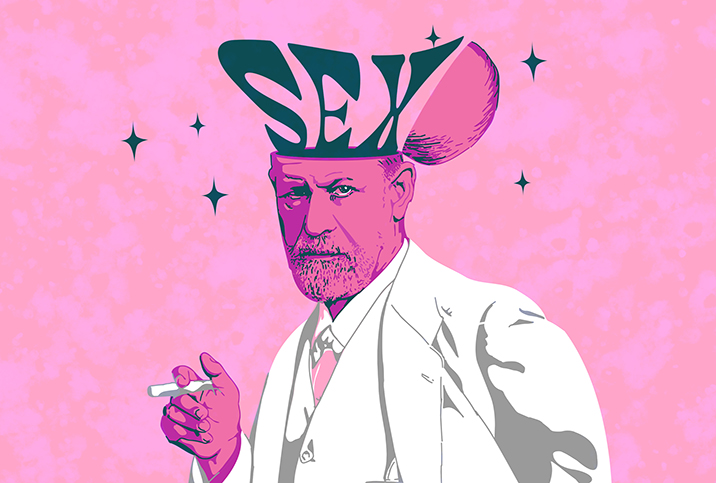Experts Unpack Sigmund Freud's Ideas About Sex

It may seem easy today to dismiss the relevance of Sigmund Freud, the Austrian psychologist who lived from 1856 to 1939 and is often regarded as the founder of psychoanalysis. But that might be a hasty move.
"It was his work on sexuality that generated a great deal of criticism of Freud," wrote Arthur Asa Berger, professor emeritus in broadcast and electronic communication arts at San Francisco State University, specializing in communications and semiotics. "I believe, however, that much of this hostility is based on misunderstanding Freud's theories and also, in the United States at least, extreme sensitivity to the topic of sexuality."
If we overcome our repressive inclinations, might Freudian ideas about sex assume renewed relevance? Or are his ideas rubbish to be discarded with the patriarchal psychology of yesteryear?
A primer on Freud and sex/sexuality
Citing Freud's "Five Lectures on Psycho-Analysis" from 1910, professor Henk de Berg at the University of Sheffield in the United Kingdom emphasized that Freud's notions of sex and sexuality aren't limited to genital intercourse.
"In other words, Freud considers everything as sexual that gives us pleasure," explained de Berg, who lectures on psychoanalysis.
John Paddock, Ph.D., a licensed psychologist who practices in New York City and Atlanta, credited Freud with championing an expansive notion of sex that takes into consideration our relationships with others.
"I think it's much more about affiliation and caretaking and that sort of thing, which is what [psychoanalyst] Joe Lichtenberg talks about," he said.
However, Harriet Fraad, Ed.D., a New York City hypnotherapist, said Freud was a product of the Victorian era. Thus, today, his insights on sex aren't all that useful.
"I think his Oedipus complex is sexist and silly," Fraad said.
The Oedipus complex
Berger took pains to explain the story of the mythological Greek hero Oedipus, who marries his mother and kills his father without knowing the true identity of either.
"We can use it to understand relationships in many contemporary films, television programs and other mass-mediated texts," Berger wrote.
"Psycho" (1960), a horror/thriller movie directed by Alfred Hitchcock, is an example of Oedipal relations seen in cinema. Characters in the Prime Video show "The Boys" also engage in an Oedipal relationship early on in the series. A scene from the second season evinces an unresolved Oedipus complex.
In addition, the Oedipus complex plays out in the world of pornography. The Maxim website published a piece in 2018 about the rise of "incest porn," often referred to as "step-fantasy." "Stepmom" was the 12th most searched term on Pornhub in 2021.
"Yes, the popularity of incest porn is testimony that Freud was on to something when he was talking about the Oedipus complex," de Berg confirmed. "But I don't think one can speak of the 'rise' of incest porn. This kind of sexual fantasy has always been with us.
"Most of the Marquis de Sade's work is about it; read, say, 'Justine' and 'Juliette,'" de Berg continued. "And many of the sexual fantasies collected in Nancy Friday's bestselling 'My Secret Garden' [1973] and its sequels are about it, too, as are websites such as Literotica."
The unconscious
The Oedipus complex is undergirded by another concept Freud popularized: the unconscious.
"According to psychoanalytic theory, every individual passes through a stage in which he or she desires the parents of the opposite sex. All of this, of course, on an unconscious level," Berger wrote.
Although Freud didn't invent the notion of the unconscious, Fraad said he fleshed out its importance.
"Freud's revelation that our conscious life is like a tip of a massive iceberg and the rest is submerged in the ocean is very, very important," she added.
Freud, sex and society
Freudian psychology is useful for comprehending individual pathologies and for social interaction, de Berg noted.
In "Civilization and Its Discontents," a book published in 1930, Freud expanded on the notion of "sadism, long since known to us as a component instinct of sexuality." He asserted that sadistic desire emerges as a "strong alloy" of sorts "between trends of love and the destructive instinct."
He termed those impulses as Eros and Thanatos, respectively, the Greek gods of love and war.
The finer points of Freud's hypothesis—that our conscience develops to balance with aggressive instincts incompatible with social life, for instance—may be debated. But guilt, shame and cultural taboos do reveal themselves when sex is at issue.
Freud also suggested that "sexual drives can be repressed, redirected, converted into their opposite and so on," de Berg explained.
The 1964 Cold War satire "Dr. Strangelove," directed by Stanley Kubrick, includes a scene where a man straddles a phallic hydrogen bomb between his legs as the weapon is dropped from a plane. A Freudian lens could interpret symbolism satirizing machismo aggression and its displacement onto methods of militarist annihilation.
In "Civilization and Its Discontents," written before the advent of the atomic bomb and the existential threat of nuclear war, Freud put a finer point on what's at stake when balancing sexual unconscious and social interaction.
"The fateful question for the human species seems to me to be whether and to what extent their cultural development will succeed in mastering the disturbance of their communal life by the human instinct of aggression and self-destruction," he cautioned. "Men have gained control over the forces of nature to such an extent that with their help they would have no difficulty in exterminating one another to the last man.
"They know this and hence comes a large part of their current unrest, their unhappiness and their mood of anxiety," he continued. "And now it is to be expected that the other of the two 'Heavenly Powers', eternal Eros, will make an effort to assert himself in the struggle with his equally immortal adversary. But who can foresee with what success and with what result?"


















